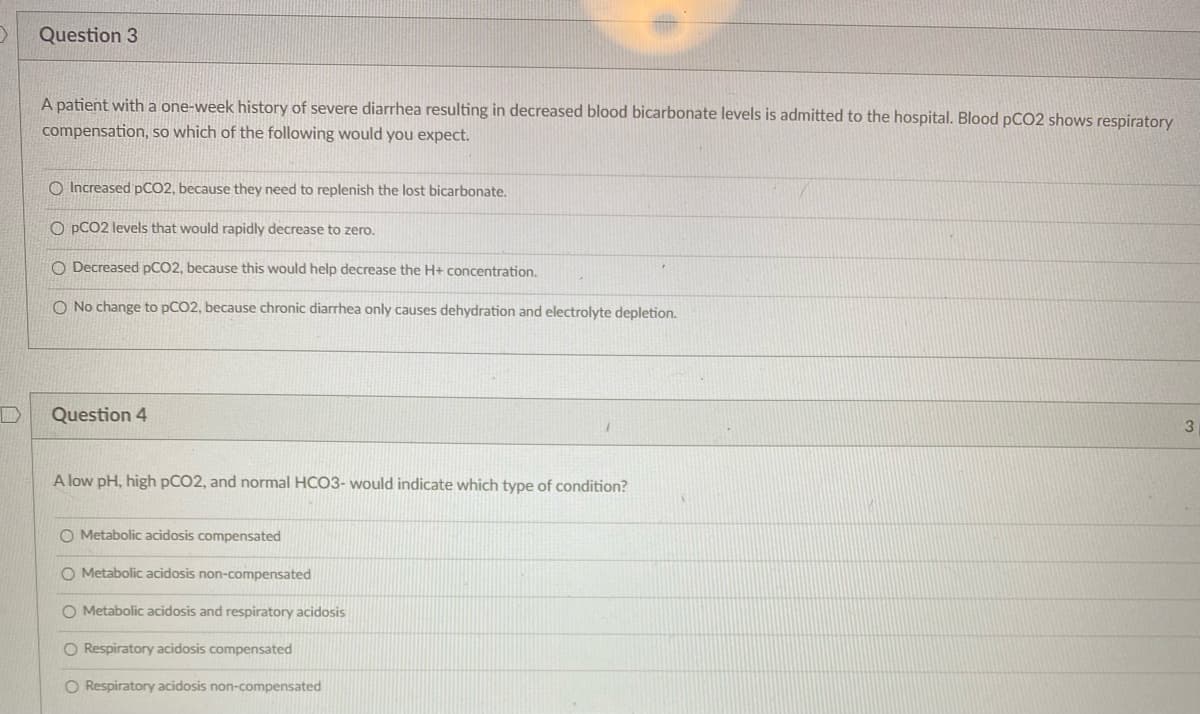A patient witha one-week history of severe diarrhea resulting in decreased blood bicarbonate levels is admitted to the hospital. Blood pCO2 shows respiratory compensation, so which of the following would you expect. O Increased pCO2, because they need to replenish the lost bicarbonate. O PCO2 levels that would rapidly decrease to zero.
A patient witha one-week history of severe diarrhea resulting in decreased blood bicarbonate levels is admitted to the hospital. Blood pCO2 shows respiratory compensation, so which of the following would you expect. O Increased pCO2, because they need to replenish the lost bicarbonate. O PCO2 levels that would rapidly decrease to zero.
Phlebotomy Essentials
6th Edition
ISBN:9781451194524
Author:Ruth McCall, Cathee M. Tankersley MT(ASCP)
Publisher:Ruth McCall, Cathee M. Tankersley MT(ASCP)
Chapter1: Phlebotomy: Past And Present And The Healthcare Setting
Section: Chapter Questions
Problem 1SRQ
Related questions
Question
Answer Q. 3

Transcribed Image Text:Question 3
A patient with a one-week history of severe diarrhea resulting in decreased blood bicarbonate levels is admitted to the hospital. Blood pCO2 shows respiratory
compensation, so which of the following would you expect.
O Increased pCO2, because they need to replenish the lost bicarbonate.
O PCO2 levels that would rapidly decrease to zero.
O Decreased pCO2, because this would help decrease the H+ concentration.
O No change to pCO2, because chronic diarrhea only causes dehydration and electrolyte depletion.
Question 4
3.
A low pH, high PCO2, and normal HCO3- would indicate which type of condition?
O Metabolic acidosis compensated
O Metabolic acidosis non-compensated
O Metabolic acidosis and respiratory acidosis
O Respiratory acidosis compensated
O Respiratory acidosis non-compensated
Expert Solution
This question has been solved!
Explore an expertly crafted, step-by-step solution for a thorough understanding of key concepts.
This is a popular solution!
Trending now
This is a popular solution!
Step by step
Solved in 4 steps

Recommended textbooks for you

Phlebotomy Essentials
Nursing
ISBN:
9781451194524
Author:
Ruth McCall, Cathee M. Tankersley MT(ASCP)
Publisher:
JONES+BARTLETT PUBLISHERS, INC.

Gould's Pathophysiology for the Health Profession…
Nursing
ISBN:
9780323414425
Author:
Robert J Hubert BS
Publisher:
Saunders

Fundamentals Of Nursing
Nursing
ISBN:
9781496362179
Author:
Taylor, Carol (carol R.), LYNN, Pamela (pamela Barbara), Bartlett, Jennifer L.
Publisher:
Wolters Kluwer,

Phlebotomy Essentials
Nursing
ISBN:
9781451194524
Author:
Ruth McCall, Cathee M. Tankersley MT(ASCP)
Publisher:
JONES+BARTLETT PUBLISHERS, INC.

Gould's Pathophysiology for the Health Profession…
Nursing
ISBN:
9780323414425
Author:
Robert J Hubert BS
Publisher:
Saunders

Fundamentals Of Nursing
Nursing
ISBN:
9781496362179
Author:
Taylor, Carol (carol R.), LYNN, Pamela (pamela Barbara), Bartlett, Jennifer L.
Publisher:
Wolters Kluwer,

Fundamentals of Nursing, 9e
Nursing
ISBN:
9780323327404
Author:
Patricia A. Potter RN MSN PhD FAAN, Anne Griffin Perry RN EdD FAAN, Patricia Stockert RN BSN MS PhD, Amy Hall RN BSN MS PhD CNE
Publisher:
Elsevier Science

Study Guide for Gould's Pathophysiology for the H…
Nursing
ISBN:
9780323414142
Author:
Hubert BS, Robert J; VanMeter PhD, Karin C.
Publisher:
Saunders

Issues and Ethics in the Helping Professions (Min…
Nursing
ISBN:
9781337406291
Author:
Gerald Corey, Marianne Schneider Corey, Cindy Corey
Publisher:
Cengage Learning